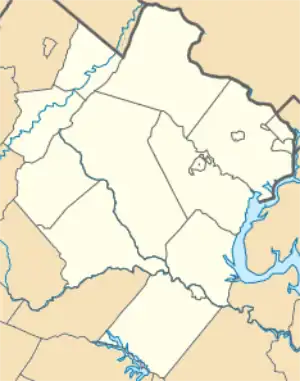High View Park
High View Park (also known as "Halls Hill") is a neighborhood in Arlington, Virginia, United States. Its approximate borders are Langston Boulevard (formerly Lee Highway) to the north, North George Mason Drive to the west, Slater Park to the east. The southern boundary is a wall, built in the 1930s to separate it from the white neighborhood of Woodlawn Park (now Waycroft-Woodlawn).[1]
High View Park (Halls Hill), Arlington, Virginia | |
|---|---|
 High View Park (Halls Hill), Arlington, Virginia Location within the Commonwealth of Virginia | |
| Coordinates: 38°53′13″N 77°8′22″W | |
| Country | |
| State | |
| County | |
| Time zone | UTC-5 (Eastern (EST)) |
| • Summer (DST) | UTC-4 (EDT) |
| ZIP codes | 22207 |
| Area code | 703/571 |
History
Prior to the Civil War, the area was owned by a slaveholder named Bazil Hall. During the war, the area was repeatedly ravaged by troops from both sides. Hall was eventually reimbursed approximately $10,000 for damages. [2] After the war, Hall sold much of the property to former slaves.
The area was later merged with an adjacent area known as High View Park.[3]
Hall's Hill
Hall's Hill was a walled enclave, in segregated Arlington County. In 2019, part of the wall was damaged.[4][5] Residents could shop at Lee Highway (now Langston Boulevard) and Glebe Road.[6] There was a volunteer fire station, Halls Hill Volunteer Fire Department , since there was not county fire service until 1951.[7] In 2016, an historic marker was erected.[8]
There were sit-ins at the People Drug store counter.[9] The first four African-American students to integrate public schools in Virginia were residents of High View Park, attending the formerly all-white Stratford Junior High School in February 1959.[10][9] Douglas E. Moore served as pastor of the Calloway Church in High View Park for three years.[11]

References
- McCaffrey, Scott. "Historical marker makes note of Arlington 'segregation wall' and its impact". InsideNova. Retrieved 2019-09-29.
- "A Guide to the African-American Heritage of Arlington County, Virginia, Second Edition 2016" (PDF). Arlington Virginia Projects & Planning. Retrieved 2020-07-16.
- McCaffrey, Scott. "Historical marker makes note of Arlington 'segregation wall' and its impact". InsideNova. Retrieved 2019-09-29.
- "Storm Destroys Portion of Historic 'Segregation Wall' in Hall's Hill". ARLnow.com. 2019-07-08. Retrieved 2021-06-13.
- "Storm Destroys Part of 'Segregation Wall' in Arlington". NBC4 Washington. Retrieved 2021-06-13.
- "Hall's Hill". www.columbia.edu. Retrieved 2021-06-13.
- "Legacy: Hall's Hill VFD and Station No. 8". library.arlingtonva.us. Retrieved 2021-06-13.
- "Once There Was a Segregation Wall in Arlington". Arlington Magazine. 2020-06-01. Retrieved 2021-06-13.
- "Crossing The Divide". Arlington Magazine. 2013-10-15. Retrieved 2021-06-13.
- Jones, Wilma (2018). Halls Hill - My Halls Hill Family, More than a Neighborhood. ISBN 978-1-7328302-0-2. Middletown, DE.
- Jones, Wilma (2018). Halls Hill - My Halls Hill Family, More than a Neighborhood. ISBN 978-1-7328302-0-2. Middletown, DE.
